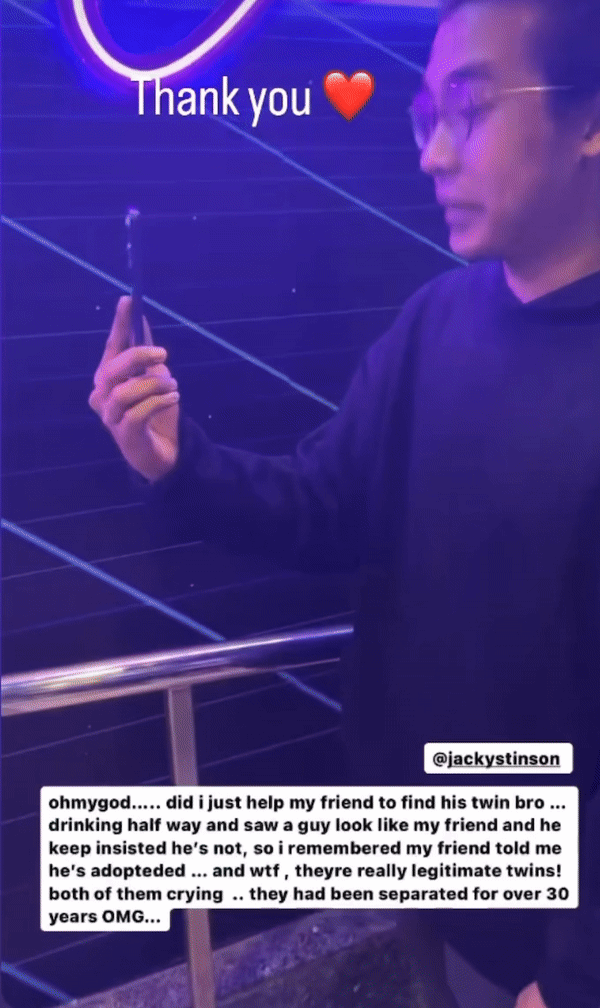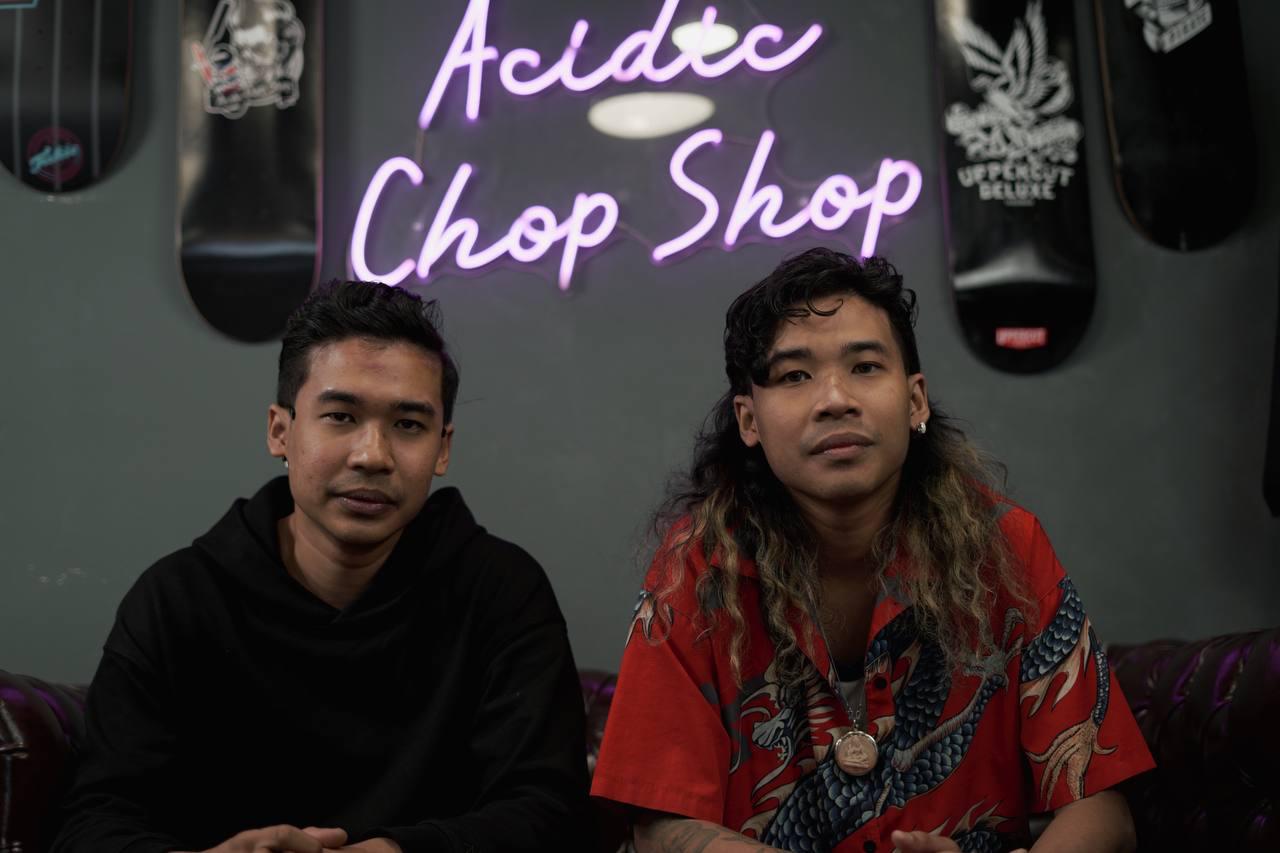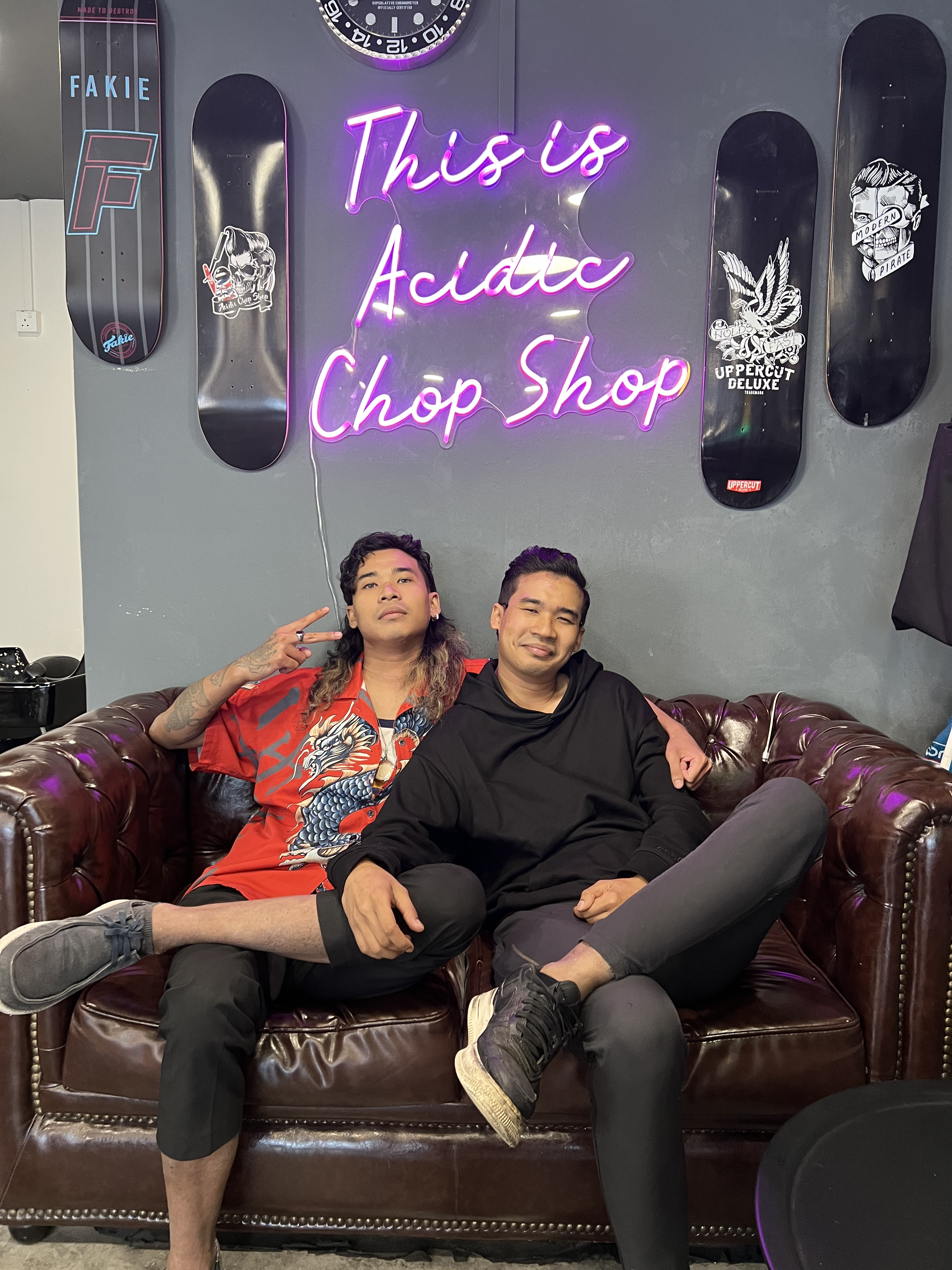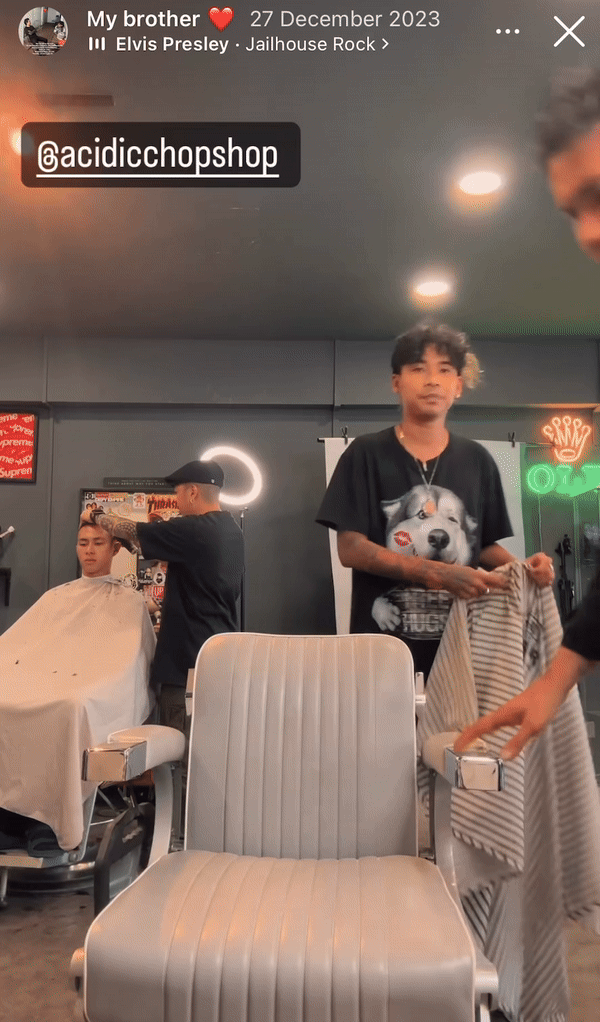It was just past 1am on Dec. 22, 2023.
31-year-old Jacky Chan was having a quiet night at home when a message came in from an old friend, who he hadn't met in 10 years.
"Are you at the pub?" she asked.
"Huh? No, I just ended work, I'm at home," he texted back.
"I saw someone like you," came the reply.
His friend, Jesse, soon texted with a request to video call from where she was: So High Social Club, a watering hole near Orchard Plaza.
Despite his skepticism, he picked up. The man he saw on the screen had glasses and a shorter haircut, but was nevertheless unmistakeable — his face could've been (and indeed was) his own.
"Once we saw [each other's] faces, we cried like a bitch," Chan quips.
"To him he found out that he had a brother. To me I finally found my brother...who I had been searching for for 11 years."
 The reunion. Video from Jacky/Instagram
The reunion. Video from Jacky/Instagram
Chan didn't go down to the pub that night. "I wasn't ready," he says.
It was his newfound brother, John, who eventually took the first step. The very next day, he went down to the barber shop where Chan worked to look for him.
"Everyone was shocked lah. My colleagues, my boss," Chan says.
I'd read online, long ago, that if you ever come face-to-face with your clone, you might not necessarily recognise yourself. "Did you immediately know him?" I ask.
"How can we not recognise?" Chan asks. "It was like a moving mirror."
"Like a selfie," John chimes in.
The lucky one
I meet the twins at Acidic Chop Shop, where Chan works as its head barber. They are uncannily identical, and yet entirely distinct in the way they carry themselves.
Chan is loquacious; John is reserved.
Chan is dressed in a bright red shirt and a devil-may-care attitude. John, an entrepreneur, comes in a plain Mark Zuckerberg-esque black hoodie.
Chan is unmarried. John has a wife and two children.
But there are similarities that are just as uncanny.
Both, for instance, like beer and can't mix their alcohol.
Both like fresh-picked durians and refuse to eat any other.
And both were raised in Chinese families. One in Singapore, the other in Kuala Lumpur, Malaysia.
 Photo from Acidic Chop Shop
Photo from Acidic Chop Shop
Here is what happened 31 years ago: the twins were born in a Malaysian hospital. Their parents, for reasons unknown, fled soon after they were born.
In Kuala Lumpur, John was the first to find out that he was adopted.
At age 6, he'd read a book on heredity and realised that while he could roll his tongue — long thought to be an inherited trait — his parents couldn't.
He confronted his parents, who confessed that he was adopted. But as he was the second of the pair to be adopted, they hadn't known he had a twin — and neither, as a result, did he.
Meanwhile, in Singapore, Chan grew up oblivious to the fact that his parents were not his biological ones.
It was only 11 years ago that Chan's father revealed three things, just before he passed: that he was adopted, that he was of Thai lineage, and that he had a twin brother.
The last hit him hard. For the next 11 years, he'd searched for his missing relation but to no avail.
"So I thought maybe this one is just a legend. Just a story. Maybe my parents got it wrong," he tells me.
Until that night. By coincidence or fate, it was the Dongzhi Festival, the day on which families traditionally reunite.
In the neon-lit dinginess of an Orchard pub, on a pixellated video call, he'd seen his mirror image looking back at him.
His father — on his deathbed — had been right.
 Photo from Jacky Chan/Instagram
Photo from Jacky Chan/Instagram
Next steps
Now that they've found each other, the twins are hoping that they'll be able to reconnect with their birth parents as well. If fate allows, they're careful to caveat.
Chan doesn't have a lot of information about them. Just that at least one of them is Thai (they suspect the other is Chinese), their mother was "super young, like 18 or 19", and that they both left the hospital immediately after delivering the twins.
It would be easy to be angry or resentful of such parents. But the brothers bear them no ill will.
"If we get to meet them, I'm grateful that they didn't throw us away," Chan says.
"We will show our appreciation. Thank you for not throwing us on the roadside, and leaving us at the hospital for two wonderful families to adopt."
John, who has seen his wife through childbirth twice, has a different view.
"I got wife I got children, so I know the feeling — to carry a child for nine months. Especially twins," he says.
"So I appreciate that when you found out you were pregnant, that you didn't go for an abortion."
They're not actively looking for their parents. After all, they already have each other.
But if they ever manage to cross paths, they just hope to express their gratitude.
"What will happen in the future we don't know," Chan says.
"But definitely there is no hate. Just — thank you."
Making up for lost time
But how do you start a sibling relationship on such grounds — in adulthood, between two entirely different people living separate lives?
Their dynamic is easy, natural (they poke fun at each other several times over the interview); but it's clear that they're still catching up with the past 31 years.
When I ask them to pose "like brothers" for a picture, Chan points out, somewhat sheepishly, that he doesn't know how.
 The eventual pose they gave me. Photo by Ilyda Chua
The eventual pose they gave me. Photo by Ilyda Chua
Still, watching them interact, I get this sense; that, robbed of three decades of brotherhood, there is a determination to make up for lost time.
To become as close as they should be, now that they can.
"I don't allow him to stay at a hotel. If you're in Singapore, you stay at my place. I even made a key," Chan says, when I ask if they've made plans to meet up more often.
Meanwhile, John is shuttling between Kuala Lumpur and Singapore more than ever. He's even made plans to bring his kids over and introduce them to their new 叔叔 (uncle) — something which Chan seems genuinely delighted at.
"I lost 31 years of having a brother. I still got 31 years of stories to share," Chan tells me simply.
"Every day we chitchat," John tells me. "But to be honest, there's not enough [time] — 31 years is too much."
Blood brothers
Nearing the end of the interview, I ask if they think they have anything in common. Their answer is immediate assent.
"[When we met], we tried to talk to each other to understand each other even more. But end up our attitude is the same. Our character is the same," Chan says.
John agrees. "Same character, different background." They fist-bump.
 Chan giving his newfound brother a haircut. Video from Jacky Chan/Instagram
Chan giving his newfound brother a haircut. Video from Jacky Chan/Instagram
You hear of stories of nature versus nurture. I've always been a believer in the latter; that bonds are stronger than blood. That family is just genetics and the time-ripened love of familiar people in a familiar place.
But maybe it's more than that. Maybe there is something magical and indubitable about a biological connection, in shared DNA, in a shared womb.
That, at least, is what the twins believe. And even I in all my crotchety pragmatism am hard-pressed to deny that there's something that ties these two men who met merely weeks ago.
"You guys are so lucky," I say, multiple times through the interview.
"I wasn't a lucky guy all my life," Chan admits. "If there is a lucky draw with five participants and three prizes, I still can never kena one.
"But when I found out about my brother, I was like 'this is the best thing to ever happen in my life'."
If you like what you read, follow us on Facebook, Instagram, Twitter and Telegram to get the latest updates.

